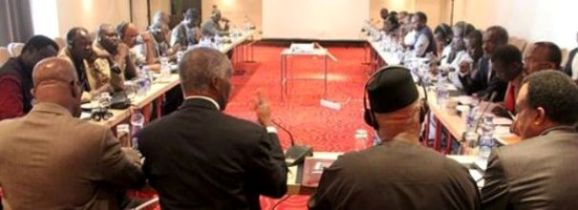Sudan government and Darfur rebels fail to agree
By Tesfa-Alem Tekle
November 27, 2014 (ADDIS ABABA) – As peace talks between the Sudanese government and two rebels groups from the Darfur region, enters the fifth day in the Ethiopian capital, Addis Ababa, the two sides have failed to strike an agreement.

Since 23 November, Sudanese government delegations and representatives of two rebel groups, the Justice and Equality Movement and the Minnawi faction of the Sudan Liberation Movement, (SLM-MM) are engaged in talks on a cessation of hostilities and security arrangements in Darfur.
Ahmed Tugud Lissan, chief negotiator on behalf of the two rebel groups on Thursday told Sudan Tribune that the two sides have created a “huge gap” on reaching agreement on agenda of the African Union-brokered peace process.
Lissan said the government has maintained its position on looking for a quick agreement on cessation of hostility and then to carry on with the national dialogue.
“This is not the right approach. There are a number of other national issues that must be resolved before jumping in to the second stage of national dialogue,” he said further, noting a need for settling issues regarding war affected areas.
Both sides, on Thursday, held preliminary a consultation meeting with the mediators.
“We are planning to enlighten reasons behind why the items of agenda we attached are important,” said Tugod.
Earlier on Thursday, the two sides held their first direct engagement on cessation of hostility in the presence of the mediation.
Accordingly, both sides discussed and interacted on draft proposal presented by the AU chief mediator, but failed to bridge differences.
With regard to the draft proposal, the rebel chief negotiator said his team partially accepts it, but expressed discontent.
“It is not enough and more is needed to be incorporated for discussion” Tugod said adding “The draft proposal is missing important issues which need to be discussed”.
REBELS DEMANDS
Following the meeting, the rebel groups issued a joint statement saying that the AUHIP proposed a draft agenda for the discussions including security arrangements, political issues, humanitarian issues, relationship between the Darfur track and the national dialogue, and the method of negotiations.
The rebel statement further said the “proposed agenda overlooked many of the core issues” and therefore suggested to add 1- land, land, Hawakeer, borders and nomad issues, 2- compensation, 3- refugees and IDPs 4- reconstruction and development issues.
“However, the government delegation rejected the inclusion of the mentioned points in the agenda on the pretext that the negotiating team does not have a mandate to discuss the roots of the Darfur crisis and its consequences,” the statement said.
Rebels want the talks in Addis Ababa to be comprehensive but the government delegation has insisted the negotiations must be an extension of Doha Document for Peace in Darfur (DDPD).
A government delegation representative Mohamed Mohamed Khair to his side stressed that Khartoum’s negotiating team wasn’t entitled to engage on other issues other than cessation of hostility and security arrangement in accordance to DDPD.
Khair said engaging on comprehensive national issues as demanded by the rebels would mean “reopening fresh talks that we have already reached agreement before”
However, he said government delegation has no objection to discuss humanitarian situation within the security arrangement.
Khair is pessimist that the ongoing Addis Ababa peace talks which aim to end over a decade long conflict in Darfur would yield positive outcome.
“I don’t think an agreement will be reached” he said adding “the mediation is most likely to suspend the talks for a while and we take the agenda back to Khartoum”
Conflict in Darfur, a region in western Sudan, which started in 2003 has killed an estimated 300,000 people and displaced nearly two million.
(ST)
